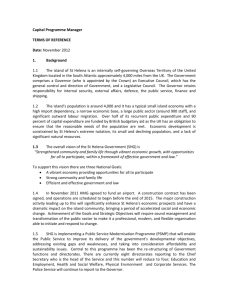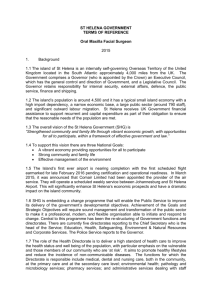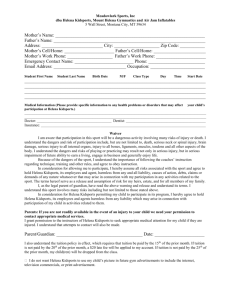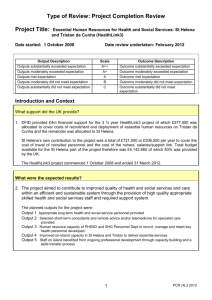St Helena Careers
advertisement
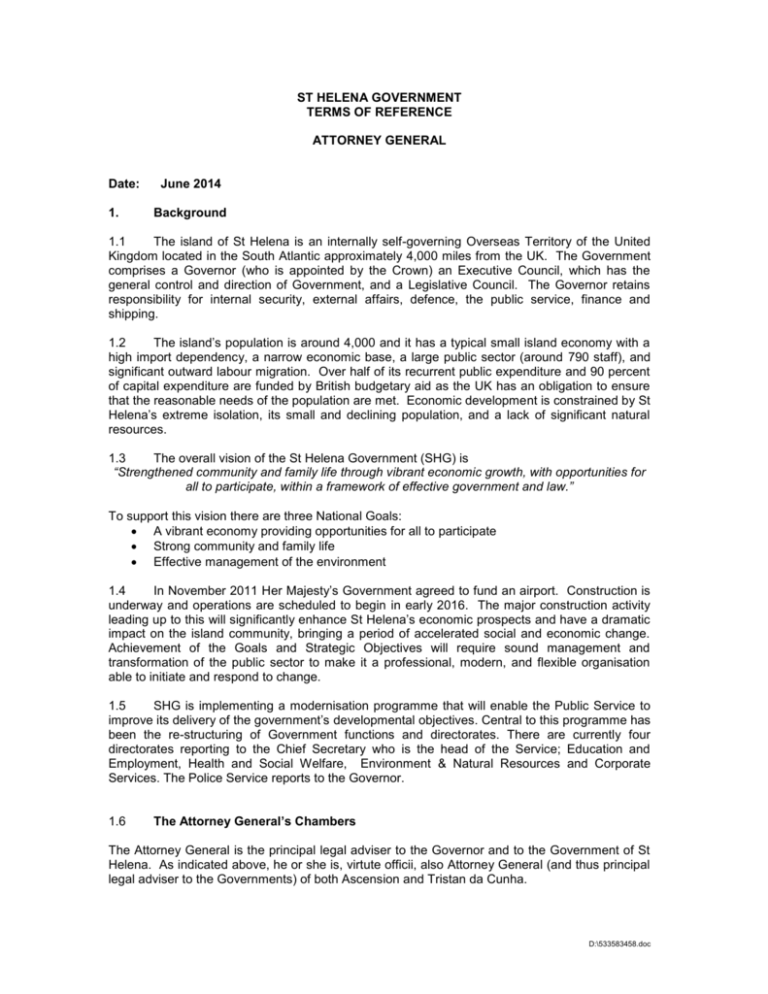
ST HELENA GOVERNMENT TERMS OF REFERENCE ATTORNEY GENERAL Date: 1. June 2014 Background 1.1 The island of St Helena is an internally self-governing Overseas Territory of the United Kingdom located in the South Atlantic approximately 4,000 miles from the UK. The Government comprises a Governor (who is appointed by the Crown) an Executive Council, which has the general control and direction of Government, and a Legislative Council. The Governor retains responsibility for internal security, external affairs, defence, the public service, finance and shipping. 1.2 The island’s population is around 4,000 and it has a typical small island economy with a high import dependency, a narrow economic base, a large public sector (around 790 staff), and significant outward labour migration. Over half of its recurrent public expenditure and 90 percent of capital expenditure are funded by British budgetary aid as the UK has an obligation to ensure that the reasonable needs of the population are met. Economic development is constrained by St Helena’s extreme isolation, its small and declining population, and a lack of significant natural resources. 1.3 The overall vision of the St Helena Government (SHG) is “Strengthened community and family life through vibrant economic growth, with opportunities for all to participate, within a framework of effective government and law.” To support this vision there are three National Goals: A vibrant economy providing opportunities for all to participate Strong community and family life Effective management of the environment 1.4 In November 2011 Her Majesty’s Government agreed to fund an airport. Construction is underway and operations are scheduled to begin in early 2016. The major construction activity leading up to this will significantly enhance St Helena’s economic prospects and have a dramatic impact on the island community, bringing a period of accelerated social and economic change. Achievement of the Goals and Strategic Objectives will require sound management and transformation of the public sector to make it a professional, modern, and flexible organisation able to initiate and respond to change. 1.5 SHG is implementing a modernisation programme that will enable the Public Service to improve its delivery of the government’s developmental objectives. Central to this programme has been the re-structuring of Government functions and directorates. There are currently four directorates reporting to the Chief Secretary who is the head of the Service; Education and Employment, Health and Social Welfare, Environment & Natural Resources and Corporate Services. The Police Service reports to the Governor. 1.6 The Attorney General’s Chambers The Attorney General is the principal legal adviser to the Governor and to the Government of St Helena. As indicated above, he or she is, virtute officii, also Attorney General (and thus principal legal adviser to the Governments) of both Ascension and Tristan da Cunha. D:\533583458.doc There are resident Solicitors General (one on each island) in St Helena and Ascension, the former being de facto Deputy Attorney General; there is no resident lawyer on Tristan Da Cunha. The team of Law Officers is completed by: • • one Crown Counsel, and a Legal Officer (not professionally-qualified),in St Helena; and a Legislative Draftsperson working remotely from Florida. The team is supported by a full-time Personal Assistant in St Helena, and the Ascension Solicitor General has separate clerical support. The Attorney General is ultimately responsible for all criminal proceedings (with a Constitutional prerogative of commencing proceedings and of taking over proceedings commenced by others) and is the nominal party – plaintiff or defendant – in all civil litigation by or against the Crown. In addition, he or she has overall responsibility for legislative drafting and for ensuring that the Laws of St Helena are kept up to date; and is required to provide legal advice, as necessary, to the holders of a number of statutory offices. There is only one professionally-qualified resident lawyer serving the need for legal services outside Government, the publicly-funded Public Solicitor. The postholder is assisted by a partially-qualified trainee solicitor, and there is a small but enthusiastic group of ‘Lay Advocates’ – formalised ‘McKenzie Friends’. Beyond the realms of domestic law, it falls to the Law Officers to ensure that Treaty requirements, including reporting obligations, are met. In St Helena, the Attorney General is a (non-voting) member of both the Executive Council and the Legislative Council; and a principal adviser to the Governor, Council Committees and all Government Directorates. [In Ascension, the Attorney General is a non-voting member of the Island Council, and a principal adviser to the Governor, the Administrator, and Departments of Government. For Tristan Da Cunha, he or she is not a member of the Island Council but acts as adviser to the Governor, the Government, and the Council.] In line management terms, the AG reports directly to the Governor; the other Law Officers report to the AG whilst the PA to the Law Officers report directly to the Solicitor General. The Law Officers in St Helena are located in The Castle, Jamestown (physically and organizationally close to the Governor’s Office). 2. Key Objectives 2.1 The Constitutional role of the Attorney General as principal legal adviser to the Crown (in right of the separate Governments of St Helena, Ascension, and Tristan da Cunha) is too diverse to admit of concise summary. Apart from functions and responsibilities specified by the Constitution and by various Ordinances (and by Common Law), the general objectives of the post are:1. to provide comprehensive, reliable, and timely legal advice to all organs of the respective Governments, responding pro-actively to issues as they arise or emerge; 2. to conduct (usually through the relevant Solicitor General or Crown Counsel, but personally when occasion requires) criminal prosecutions in accordance with the established principles of criminal justice in which the prosecutor is a ‘minister of justice’ whose ultimate duty is to the due administration of justice; 3. to provide an effective and professional service (again, usually through the subordinate Law Officers) in the conduct of Crown proceedings. 2 4. to lead the institutional development of the Attorney General’s Chambers and strategic future needs of the island of its legal system/sector including facilitating the establishment of a commercial law firm. In addition to purely legal work, the Attorney General is one of the senior advisers to the Governor on a wide range of issues 3. Scope of Work 3.1 The Attorney General is expected to be a ‘self-starter’, capable of doing (and willing to do) the job without close supervision; he or she will be a pro-active and innovative problem solver, whose principal tasks will (with the assistance of the other Law Officers, and – where appropriate – external support) include, but not be limited to, the following: (a) to have the overall charge of all Crown Proceedings (both criminal and civil); (b) to undertake other legal work for the Government of St Helena: (c) Provide general legal advice to the Governor, the Legislative and Executive Councils, Council Committees, and the Public Service. (d) Draft contracts/agreements and other legal instruments (including, as necessary, being involved in any negotiation process leading up to the preparation of such contracts/agreements). (e) Advise Members of the Legislative Council regarding actual or potential Council business, including Bills, with respect to any queries or clarifications relating thereto. (f) Oversee all legislative drafting. (g) Participate in public or other consultative processes on legal issues at different fora, including meetings at which draft legislation is being discussed. (h) Develop the institutional arrangements of the Attonery General’s Chambers to reflect the changing needs of the island with air access. (i) Lead in the strategic development of legal services on St Helena including the establishement of a commercial law firm. (j) To provide appropriate management and leadership of the legal team. (k) Perform such other duties (appropriate to the post) as may be required by the Governor from time to time. (l) To provide corresponding services to the Governments of Ascension and Tristan da Cunha. (m) To serve as a (non-voting) member of both the Legislative Council and the Executive Council in St Helena; (n) To serve as a (non-voting) member of the Island Council on Ascension; (o) To provide legal advice and assistance (provided there is no conflict of interest – including conflict in the allocation or use of resources) to statutory and voluntary organisations. 4. Qualifications and experience 3 4.1 Essential The AG will be expected to have qualified as a solicitor or barrister in England and Wales or an equivalent qualification elsewhere in the UK or in a Commonwealth jurisdiction with at least 7 years post qualification experience which should include: Litigation – both civil and criminal, and including experience of higher-court advocacy Both public and private sector with the former preferably within an Overseas Territory; Working in a small and isolated community 4.2 Desirable 10 years post qualification experience including in the above areas with criminal litigation to include prosecution decision making in view of the AG’s overall responsibility for prosecutions 5. Competencies Under the SHG Competency framework, this post holder is required to have the competencies as outlined in the attached annex. 6. Outputs, Timing and Reporting 1. The Attorney General shall provide to the Governor monthly reports on progress against key indicators/objectives to be agreed in advance with the Governor. 2. The post will be for two years (subject to the provisions of The St Helena, Ascension and Tristan da Cunha Constitution Order 2009). Performance will be measured with respect to the Attorney General’s Chambers’ overall performance in service delivery, increases in operational effectiveness and efficiency. A probationary report will be completed after 6 months. 3. The Attorney General will report directly to the Governor. 4 Annex SHG Competency Framework Levels Professional Development Requirements for Continuous Professional Development met in terms of requisite number of hours/number of development sessions, etc., and when necessary submitted to Professional Institute to maintain professional status. Planning and delivery of work Structures business or service unit to deliver key objectives and obtain and allocate resources. Defines a balanced set of targets and measures aligned with delivery plans. Analysis and use of information Identifies trends from complex or conflicting data. Takes steps to address the root causes of highly complex problems Develops new policy and procedures. Decision making Shapes new policies and sets long-term objectives. Understands the wider strategic environment to make appropriate resource decisions. Strategically processes the impact of decisions. Determines results which are aligned to strategic decisions Ensures decisions are evidence-based drawing on available knowledge and past experience Working with others Manages relationships with key stakeholders by utilising a high level of understanding of own and other’s behaviours. Develops relationships with key stakeholders. Influences key stakeholders on issues relevant to the organisation. Creates an environment which will enable delivery of shared policy outcomes Communication Promotes communication across the organisation. Negotiates to reconcile individual competing priorities Communicates the organisation’s priorities Summarises complex information in an effective manner Influencing and persuading Influences the organisation’s strategy by utilising internal and external resources. Delivers influential advice and briefings. Focuses on outcomes irrespective of the source of the challenge. Sets strategies to support a diverse workforce. Dealing with change Takes wide view of strategic needs. 5 Directs and drives organisational change Evaluates the impact of change on the organisation. Initiates attitudinal change across the organisation Provides appropriate support mechanisms during a period of change Continuous improvement Keeps up to date with developments that affect SHG and anticipates what may affect it in the future. Creates an environment which allows people to improve the way they work. Creates an environment where employees and colleagues work to improve the way things are done. Managing resources Ensures resources are allocated and used to meet key priorities. Sets corporate directives and develops long-term strategies to achieve this. Ensures that others buy in to corporate goals and functions 6
